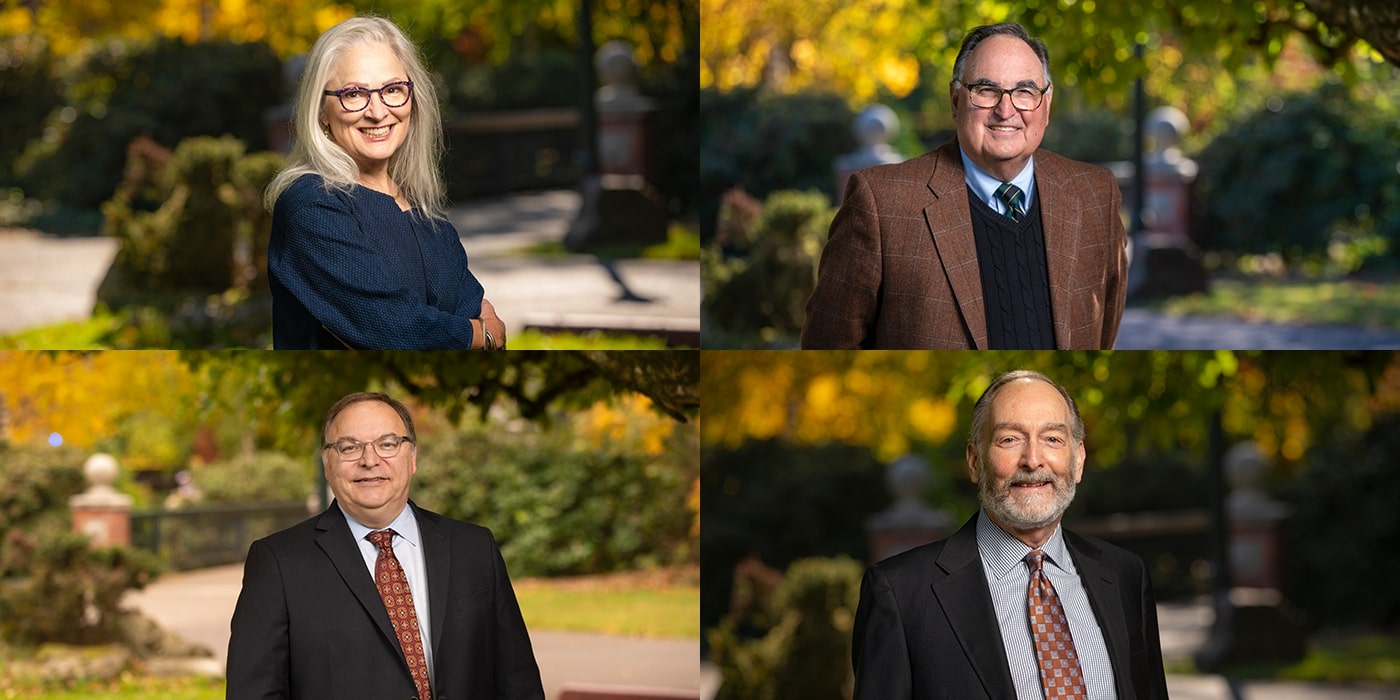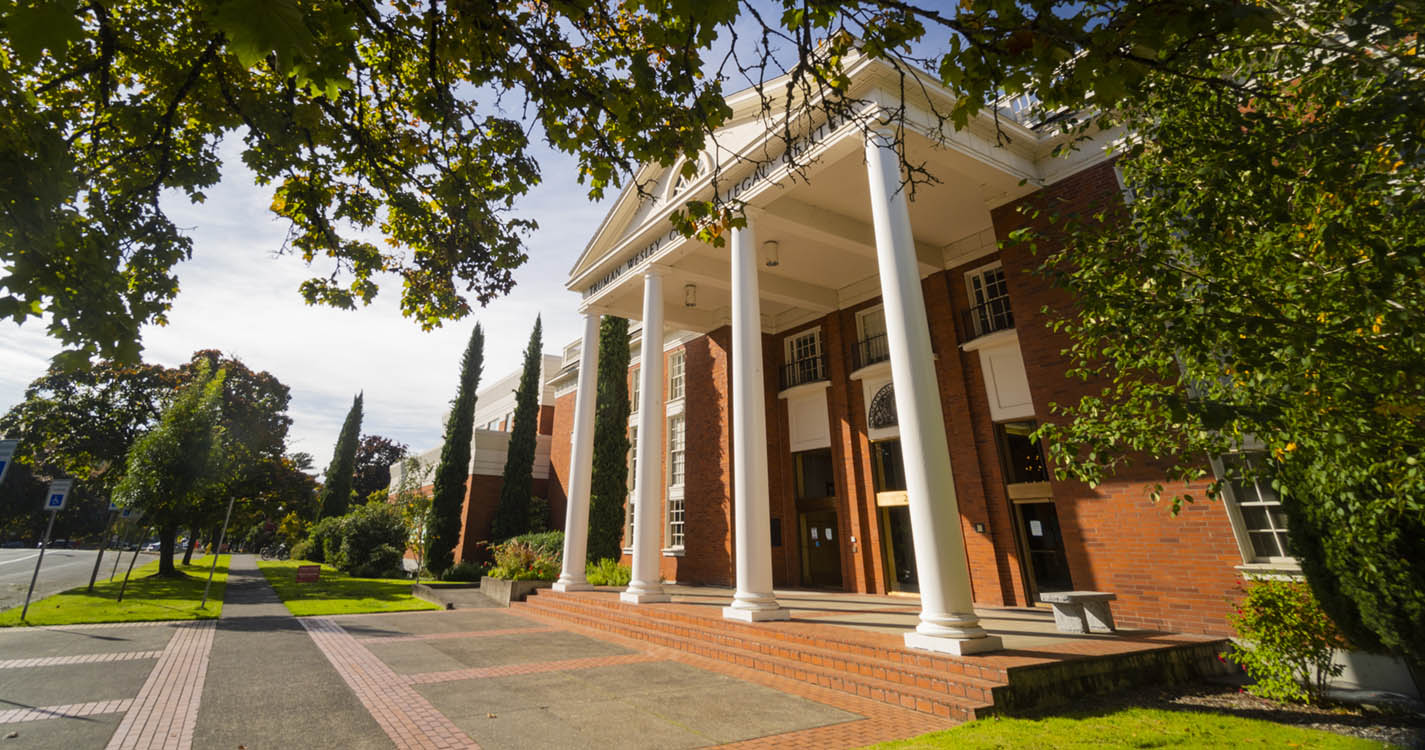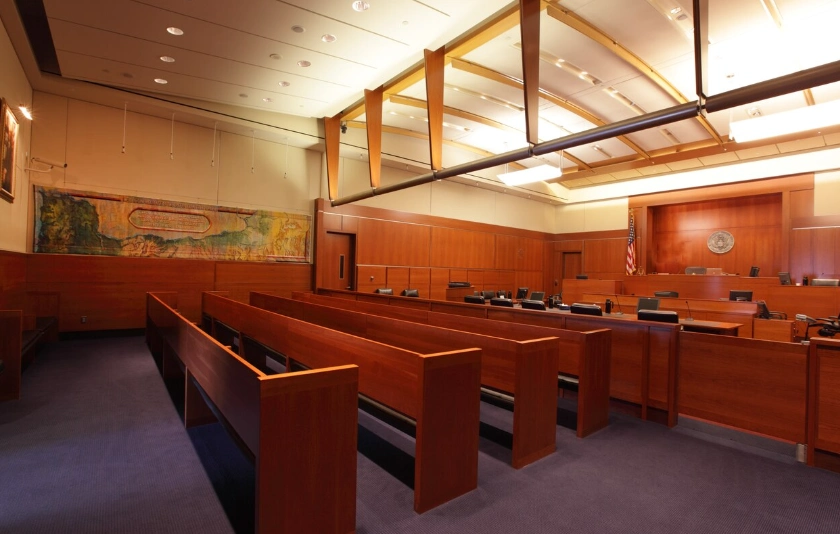Willamette Law faculty includes some of the most respected legal scholars in the country nationally recognized for their research, publications and contributions to the law. Yet it is their deep dedication to their students that distinguishes these professors from others. The school's comprehensive curriculum is further strengthened by the talented lawyers and jurists who serve as Willamette's adjunct professors and visiting faculty.
Students benefit in hearing firsthand from jurists serving on the bench — though the judges themselves say they’re the lucky ones. Hear from a few who have been involved with Willamette Law for decades.
Judge Norman Hill JD’94
In 2008, Judge Norman Hill JD’94 finally got the call.
“I’ve always had this recurring nightmare that I didn’t really graduate from law school and pass the bar, and they’ll call me and tell me they’ve made a mistake,” Hill laughs. “In 2008, I had been in practice for a while and got a phone message from [then-Dean] Kathy Graham. I thought to myself, this is the call.”
Instead, Graham wondered if Hill would return to his alma mater to teach Real Estate Transactions. At the time, he was an attorney in private practice. He agreed, and eventually, began teaching another course and Trial Practice. After becoming a judge in 2012 and developing an expertise in Juvenile Law, he added another course to his repertoire.
Now the presiding judge in Polk County Circuit Court, he teaches two courses each in the spring and fall, in addition to the winter intersession Trial Practice course. Despite the time commitment to both careers, he says it’s incredibly gratifying to teach.
“It’s so much fun,” he says. “For me, as a circuit judge, engaging with the students is an antidote to cynicism. Their energy and enthusiasm is infectious. Some people golf or play tennis for their mental health, but I teach.”
In the early 90s, Hill recalls seeing a promotional brochure for Willamette that highlighted the number of Oregon judges who had attended the school. He remembers the message as, “If you want to be a judge, come to Willamette.” Although he did not always intend to become a judge, Willamette prepared him well.
He says he had fantastic professors who were judges, including former Oregon Supreme Court Justices Jack Landau and Paul De Muniz, who still teach.
“Having that connection with the bench on the local and state level was integrated into the curriculum,” Hill says. “When I got into private practice, it was my first time arguing in the Court of Appeals, and I walked into the courtroom and Judge Sue Leeson [who also later served on the Oregon Supreme Court] was on the panel, and I was on a first-name basis with her because she taught at Willamette. That gave me a comfort level I would not have had without that experience.”
Justice Jack Landau
In January of 1993, Justice Jack Landau started two new jobs. He had already agreed to teach a course on Legislation at Willamette Law when he was appointed to the Oregon Court of Appeals by then-Gov. Barbara Roberts.
Landau had only just begun teaching when Hill was his student. Now, he’s been at the school for 31 years. Over that time, he has been involved in Moot Court competitions, served as an attorney mentor, published articles in the Willamette Law Review and participated in symposia.
But Landau’s judicial career only grew busier. After 18 years on the Court of Appeals, Landau became an associate justice on the Oregon Supreme Court, serving from 2011 to 2017.
“I usually arranged to teach my class over the lunch hour so it didn’t interfere with cases,” he says. “Sometimes, I’d be on the bench until just before noon, and I’d throw off my robe, grab a granola bar and head over to teach, then be back on the bench at 1:30. Those days were very full days.”
Landau says being a judge was a “terrific privilege” and that being a working judge deeply enriched his courses. At the same time, he says teaching profoundly enriched his time on the bench.
Splitting his time allowed him to show students the real world implications of what they were studying — making classes less abstract and much more real.
“Teaching was my first job out of law school. I always loved it and never wanted to give it up,” he explains. “On the bench, I was stubbornly insistent that I got to do both. I feel really lucky. It’s so gratifying to know that what you’re doing in the classroom makes a difference in the lives of others.”
Judge Mary James
Though she attended the University of Notre Dame, Judge Mary James affectionately calls Willamette Law her “adopted law school.” Having spent the last 30+ years as an attorney mentor, appellate competition judge, coach for trial practice, speaker on professionalism and lecturer, it’s easy to see why.
James first became an attorney mentor in 1992. After volunteering for two decades, the school needed a new instructor for Pre-Trial Civil Litigation. When she signed on, she had just over a month to prepare before classes started in August.
By that time, she had been a judge for nine years and had two decades of litigation experience, and she took it on with gusto. She also taught Civil Trial Practice for 10 years, providing students with practicum skills that prepared them to advocate for clients in court.
Occasionally, she’d wonder how she had the energy for two busy careers. But she felt it was her responsibility to give back.
“There are a lot of things you can’t do as a judge,” she explains. “You can’t support political parties and can’t be on the board of organizations that may come before you in court.
“I wanted to be useful off the bench and stay engaged in the law in a way that was productive and helped pass the torch to lawyers in training. For me, that was a really important piece to stay connected, and I found the time to make it work.”
James says she has learned so much herself from the students she’s taught. The work kept her humble, she says, and she enjoyed spending time with students learning to be advocates for the rule of law.
Today, while still mentoring informally, James participates in Oregon’s senior judge program, serving 35 business days a year for five years following retirement. The assignments send her all over the state. She has presided over courts in Clatsop, Multnomah and Umatilla Counties, among others.
But she’s never far from Willamette and the opportunity to make a difference with students in Salem.
“I feel like I’m an honorary alumni,” she says. “I kind of always felt like I adopted Willamette, and they adopted me.”
Justice Paul De Muniz JD’75
Justice Paul De Muniz JD’75 took a non-traditional path to law school, first enlisting in the US Air Force at 18, serving in Vietnam, then attending college and finishing in just two and a half years. Then, he was admitted to Willamette Law — and after his graduation, it didn’t take long for him to return to the school.
Although he never anticipated becoming a lawyer, he has always been grateful for the education he received at Willamette and the opportunities it afforded him in his legal career. The former chief justice of the Oregon Supreme Court had only been out of law school for three or four years when he was asked to teach a last-minute class. As a practicing lawyer in Salem at the time, it wasn’t hard to say yes.
Following 13 years in private practice, De Muniz joined the Oregon Court of Appeals and was on the court from 1990 to 2000, eventually serving as a presiding judge. In 2000, he was elected to the state supreme court, serving as chief justice from 2006 to 2012.
Throughout that time, De Muniz continued teaching, as well as participating in the Attorney-Mentor Program, even receiving the Mentor of the Year Award. He didn’t start the tradition of the supreme court visits to the three Oregon law schools, but he did help expand the program to high schools throughout the state — a great opportunity to reach young people about the three branches of government, he says.
“It was busy, but when you’re doing something you don’t really consider work, it all works out,” he explains. “I think all of us who’ve [taught while on the bench] considered it like a privilege.”
After retiring from the bench in 2012, De Muniz has reached nearly 20 years of teaching at Willamette Law. He gets great joy in teaching and making personal connections with students, he says.
“I think particularly in the third year, students are very interested in the practical application of law. Willamette has been blessed with closeness to the supreme court with it being just down the block,” he says. “Many justices have taught there. It’s an opportunity for students to get the best of both worlds — hearing from people who are law types but also have practical experience with the law. That’s what judges bring to the teaching position.”




